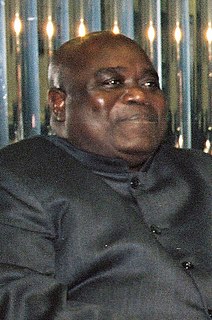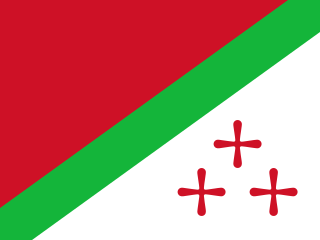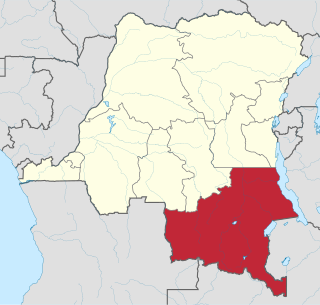Related Research Articles

Laurent-Désiré Kabila or simply Laurent Kabila, was a Congolese revolutionary and politician who was the third President of the Democratic Republic of the Congo from 1997 until his assassination in 2001.

Moïse Kapend Tshombe was a Congolese businessman and politician. He served as the president of the secessionist State of Katanga from 1960 to 1963 and as prime minister of the Democratic Republic of the Congo from 1964 to 1965.

The First Congo War (1996–1997), also nicknamed Africa's First World War, was a civil war and international military conflict which took place mostly in Zaire, with major spillovers into Sudan and Uganda. The conflict culminated in a foreign invasion that replaced Zairean president Mobutu Sese Seko with the rebel leader Laurent-Désiré Kabila. Kabila's uneasy government subsequently came into conflict with his allies, setting the stage for the Second Congo War in 1998–2003.

Évariste Leon Kimba Mutombo was a Congolese journalist and politician who served as Foreign Minister of the State of Katanga from 1960 to 1963 and Prime Minister of the Democratic Republic of the Congo from 13 October to 25 November 1965. Kimba was born in 1926 in Katanga Province, Belgian Congo. Following the completion of his studies he worked as a journalist and became editor-in-chief of the Essor du Congo. In 1958 he and a group of Katangese concerned about domination of their province by people from the neighbouring Kasaï region founded the Confédération des associations tribales du Katanga (CONAKAT), a regionalist political party. In 1960 the Congo became independent and shortly thereafter Moise Tshombe declared the secession of the State of Katanga. Kimba played an active role in the separatist state's government as its Minister of Foreign Affairs and participated in numerous talks with the central government aimed at political reconciliation. Following the collapse of the secession in early 1963, Kimba had a falling out with Tshombe and took up several ministerial posts in the new province of South Katanga.

The State of Katanga, also sometimes denoted as the Republic of Katanga, was a breakaway state that proclaimed its independence from Congo-Léopoldville on 11 July 1960 under Moise Tshombe, leader of the local Confédération des associations tribales du Katanga (CONAKAT) political party. The new Katangese state did not enjoy full support throughout the province and was constantly plagued by ethnic strife in its northernmost region. It was dissolved in 1963 following an invasion by United Nations Operation in the Congo (ONUC) forces, and reintegrated with the rest of the country as Katanga Province.

Shaba II was a brief conflict fought in the Zairean province of Shaba in 1978. The conflict broke out on 11 May 1978 after 6,500 rebels from the Congolese National Liberation Front (FNLC), a Katangese separatist militia, crossed the border from Angola into Zaire in an attempt to achieve the province's secession from the Zairian regime of Mobutu Sese Seko. The FNLC captured the important mining town of Kolwezi.

The Congolese National Liberation Front is a political party funded by rebels of Katangese origin and composed of ex-members of the Katangese Gendarmerie. It was active mainly in Angola and Zaire during the 1970s.
Lieutenant-Colonel Joseph-Damien Tshatshi Djamba was a Congolese military officer who was assassinated by rebels at Kisangani on 23 July 1966 during the Kisangani mutiny. Tshatshi began his military career in the Force Publique under Belgian colonial rule and later trained at the Officer Training School at Luluabourg. He remained with the army after Congolese independence in 1960 in the re-formed Armée Nationale Congolaise (ANC). He remained loyal to the government at Léopoldville during the Congo Crisis and participated in the repression of the Katanga secession after 1963. He was nicknamed "the terrible". A loyalist to Joseph-Désiré Mobutu, he was a signatory to the proclamation of the Second Republic on 24 November 1965. At the time of his death, he commanded the 5th Mechanised Brigade and was serving as Republican Commissioner for the Provinces of Haut-Congo, Kibali-Ituri, and Uélé.

The Simba rebellion of 1963–65, also known as the Orientale Revolt, was a rebellion in the Democratic Republic of the Congo which took place within the wider context of the Congo Crisis and the Cold War. The rebellion, located in the east of the country, was led by the followers of Patrice Lumumba, who had been ousted from power in 1960 by Joseph Kasa-Vubu and Joseph-Désiré Mobutu and subsequently killed in January 1961 in Katanga. The rebellion was contemporaneous with the Kwilu Rebellion led by fellow Lumumbist Pierre Mulele in central Congo.
The Progressive Congolese Students was a Zairean student political movement active in exile. Its main centre of activity was Belgium, particularly Université catholique de Louvain based in Louvain-la-Neuve. Politically, it had a Lumumbist orientation. It had relations with the Progressive Reform Party. The ECP was frequently plagued by infiltrations by agents of the Mobutist regime. ECP published a magazine entitled Congo-Libération.

Mai-Mai Kata Katanga, also called Mai-Mai Bakata Katanga, is a mai-mai rebel group in the Democratic Republic of the Congo which advocates the independence of the Congo's Katanga Province. It was formed shortly after the group's leader, Gédéon Kyungu Mutanga, escaped from prison in September 2011 where he was serving a sentence for crimes against humanity committed by his supporters between 2002 and 2006 in central Katanga. Kata Katanga means "cut [e.g. secede] Katanga" in Swahili. It has been estimated that, at its height in 2013, the Kata Katanga rebels numbered approximately 3,000 of whom most were based in Mitwaba Territory.

The Katanga insurgency refers to the ongoing rebellion by a number of rebel groups in the Democratic Republic of the Congo, some of which aim for the creation of a separate state within Katanga. While the insurgency has been active in various forms since 1963, insurgent groups have recently redoubled their efforts after the 2011 jail break that freed Gédéon Kyungu Mutanga, who commanded the majority of the Katangese separatist groups until his surrender to Congolese authorities in October 2016.

Operation Grandslam was an offensive undertaken by United Nations peacekeeping forces from 28 December 1962 to 15 January 1963 against the forces of the State of Katanga, a secessionist state rebelling against the Republic of the Congo in central Africa. The Katangese forces were decisively defeated and Katanga was forcibly reintegrated into the Congo.

Jason Sendwe was a Congolese politician and a leader of the Association Générale des Baluba du Katanga (BALUBAKAT) party. He served as Second Deputy Prime Minister of the Democratic Republic of the Congo from August 1961 until January 1963, and as President of the Province of North Katanga from September 1963 until his death, with a brief interruption.

The Zairian Civil Guard was a militarised police force in Zaire, created to support the regime of Mobutu Sese Seko.

The Battle of Kabalo was a battle fought at Kabalo by United Nations peacekeeping forces and Baluba militias from 7 April to 11 April 1961 against mercenaries and the gendarmerie of the State of Katanga, a secessionist state rebelling against the Republic of the Congo in central Africa. The Katangese forces attacked the town as part of a larger offensive meant to restore their authority in northern Katanga which was challenged by the Baluba. A United Nations Operation in the Congo peacekeeping contingent garrisoning Kabalo, acting under the authority of their mandate to prevent civil war in the country, resisted the initial attack and arrested 30 mercenaries in Katanga's employ. Armed Baluba repelled a Katangese ferry carrying troops as well as an armoured train. The next day the ferry returned but was sunk by UN forces. Fighting continued over the next few days between the Baluba and Katangese until the latter withdrew. The battle led to a deterioration of relations between the Katangese government and the United Nations Operation in the Congo.

The Katangese Gendarmerie, officially the Katangese Armed Forces, was the paramilitary force of the unrecognized State of Katanga in Central Africa from 1960 to 1963. The forces were formed upon the secession of Katanga from the Republic of the Congo with help from Belgian soldiers and former officers of the Force Publique. Belgian troops also provided much of the early training for the Gendarmerie, which was mainly composed of Katangese but largely led by Belgians and later European mercenaries.

Pierre Yambuya Lotika Kibesi was a Zairean helicopter pilot, civil servant, and political refugee.
Jean-Baptiste Kibwe Pampala Uwitwa was a Congolese and Katangese politician who was the Minister of Justice and Vice-President of the State of Katanga.

Operation Unokat, also styled Operation UNOKAT, was an offensive undertaken by United Nations peacekeeping forces from 5 December 1961 to 21 December 1961 against the gendarmerie of the State of Katanga, a secessionist state rebelling against the Republic of the Congo in central Africa. The Katangese forces were gradually pushed back and the Katangese agreed to negotiate an agreement with the Congolese central government,
References
- 1 2 Abbott 2014, pp. 34–35.
- ↑ Abbott 2014, pp. 21–23.
- ↑ Abbott 2014, p. 34.
- ↑ Abbott 2014, p. 36.